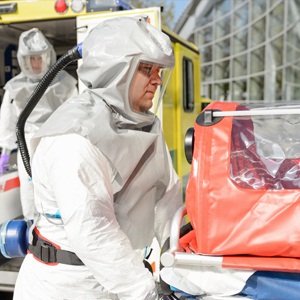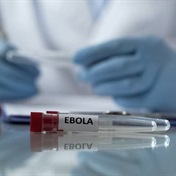
Shutterstock
UPDATE:
Authorities say the top doctor treating Ebola in Sierra Leone (see article below) has died from the disease. Dr. Sheikh Umar had been hospitalised in quarantine since he contracted the virus that has killed more than 670 people across West Africa this year.
His death Tuesday 29 July was confirmed by chief medical officer Dr. Brima Kargbo.
Health workers have been especially vulnerable to contracting Ebola, which is spread through bodily fluids such as saliva, sweat, blood and urine. Two American health workers are currently being hospitalized with Ebola in neighbouring Liberia.
Read: Could Ebola hit South Africa?
Dr Shek Umar Khan contracts Ebola - 24 July
The doctor in charge of dealing with Sierra Leone's growing Ebola crisis has announced that he has himself become infected with the disease. Ebola has a fatality rate of over 90% and has killed over 630 people in West Africa since February.
The high-profile case comes just days after three nurses working in Khan's hospital died after contracting Ebola from patients they were treating. As a result, dozens of nurses conducted a sit-down strike to put pressure on the government to isolate the Ebola ward from the rest of the hospital.
They also want Medecins San Frontieres (MSF), an international aid organisation, to take over treatment of the illness.
Read: Experimental Ebola drugs not available in Africa
Treating the illness, which currently cannot be cured, has faced unexpected obstacles as infected citizens have resisted hospitalisation, believing it to be a "death sentence" due to Ebola's incredibly high fatality rate.
Recently, police in Sierra Leone had to use tear gas to prevent locals from recovering the bodies of family members who had died from the illness due to the high risk of infection. People with the disease have taken to hiding out in forests to avoid medical teams trying to treat the condition, claims MSF. One centre which had been treating 25 cases of Ebola now has just one despite the infection rate increasing.
Sheikh Umar Khan has been hailed as a national hero for his work in fighting the outbreak and the country's health minister was reported to be in tears when she heard the news.
Read: Red Cross accused of starting epidemic
While there is as yet no cure for the virus, early treatment significantly boosts an individual's chance of survival. Such treatment involves supporting the body's attempts to fight the disease by administering antibiotics and electrolytes. One of the main characteristics of Ebola is severe haemorrhaging meaning that procoagulants also form part of a successful treatment regime. However, the fatality rate is still exceptionally high.
Most victims die from dehydration or organ failure resulting from shock. Those who survive may make a total recovery while others could suffer long-term inflammation and eye problems.
The outbreak in West Africa currently affects 3 countries Guinea, where the outbreak began, Sierra Leone and Liberia. The number of cases is steadily rising and there are fears it could spread to other neighbouring countries.
Read more:
WHO calls emergency meeting on Ebola outbreak
"Drastic action" needed for Ebola fight
Epidemic out of control - WHO
Sources: Baylor College of Medicine/BBC/Mirror
Authorities say the top doctor treating Ebola in Sierra Leone (see article below) has died from the disease. Dr. Sheikh Umar had been hospitalised in quarantine since he contracted the virus that has killed more than 670 people across West Africa this year.
His death Tuesday 29 July was confirmed by chief medical officer Dr. Brima Kargbo.
Health workers have been especially vulnerable to contracting Ebola, which is spread through bodily fluids such as saliva, sweat, blood and urine. Two American health workers are currently being hospitalized with Ebola in neighbouring Liberia.
Read: Could Ebola hit South Africa?
Dr Shek Umar Khan contracts Ebola - 24 July
The doctor in charge of dealing with Sierra Leone's growing Ebola crisis has announced that he has himself become infected with the disease. Ebola has a fatality rate of over 90% and has killed over 630 people in West Africa since February.
The high-profile case comes just days after three nurses working in Khan's hospital died after contracting Ebola from patients they were treating. As a result, dozens of nurses conducted a sit-down strike to put pressure on the government to isolate the Ebola ward from the rest of the hospital.
They also want Medecins San Frontieres (MSF), an international aid organisation, to take over treatment of the illness.
Read: Experimental Ebola drugs not available in Africa
Treating the illness, which currently cannot be cured, has faced unexpected obstacles as infected citizens have resisted hospitalisation, believing it to be a "death sentence" due to Ebola's incredibly high fatality rate.
Recently, police in Sierra Leone had to use tear gas to prevent locals from recovering the bodies of family members who had died from the illness due to the high risk of infection. People with the disease have taken to hiding out in forests to avoid medical teams trying to treat the condition, claims MSF. One centre which had been treating 25 cases of Ebola now has just one despite the infection rate increasing.
Sheikh Umar Khan has been hailed as a national hero for his work in fighting the outbreak and the country's health minister was reported to be in tears when she heard the news.
Read: Red Cross accused of starting epidemic
While there is as yet no cure for the virus, early treatment significantly boosts an individual's chance of survival. Such treatment involves supporting the body's attempts to fight the disease by administering antibiotics and electrolytes. One of the main characteristics of Ebola is severe haemorrhaging meaning that procoagulants also form part of a successful treatment regime. However, the fatality rate is still exceptionally high.
Most victims die from dehydration or organ failure resulting from shock. Those who survive may make a total recovery while others could suffer long-term inflammation and eye problems.
The outbreak in West Africa currently affects 3 countries Guinea, where the outbreak began, Sierra Leone and Liberia. The number of cases is steadily rising and there are fears it could spread to other neighbouring countries.
Read more:
WHO calls emergency meeting on Ebola outbreak
"Drastic action" needed for Ebola fight
Epidemic out of control - WHO
Sources: Baylor College of Medicine/BBC/Mirror




 Publications
Publications
 Partners
Partners










